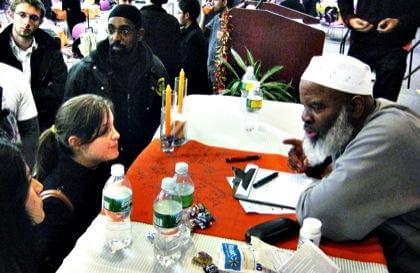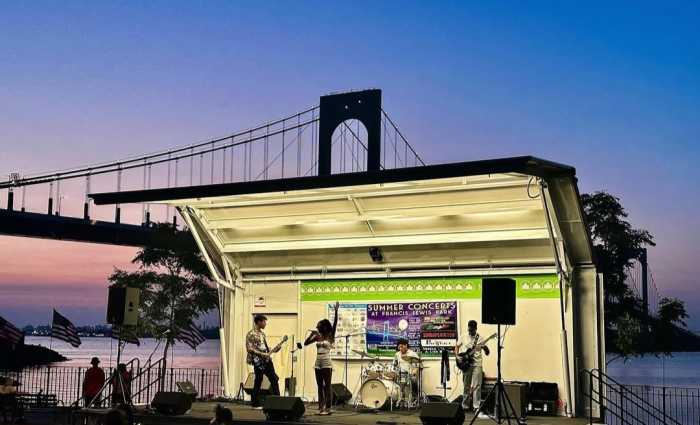By Anna Gustafson
Imam Sirah Wahhaj emphasized the importance of openly discussing him being named an unindicted co-conspirator of the 1993 World Trade Center bombing at a talk attended by hundreds of Queens College students and staff members last week.
“I know you’ve read many disturbing things about me,” Wahhaj said at the event held Thursday evening. “I stand in front of you, and I swear by Allah, I have never plotted any plan against this government. Never in my life have I done that.”
In 1993, U.S. Attorney Mary Jo White gave a list of 171 names she said were unindicted co-conspirators of the World Trade Center bombing. Of those names, Wahhaj was one.
“I was never indicted, never tried, but that statement went around the world,” he said. “Now before my name, the media always says Siraj Wahhaj, co-conspirator of the World Trade Center bombing. It isn’t fair.”
Prior to giving the talk he had been scheduled to give about Thanksgiving, Wahhaj, the imam of At-Taqwa mosque in Brooklyn, addressed the controversy surrounding his visit.
In recent weeks, some members of the Queens College Republicans called for the college to cut off funding to the Muslim Students Association, which sponsored the imam’s visit to the campus, after the GOP group said a member of the MSA made anti-Jewish remarks at a filming of “Fitna,” a movie that some MSA members said was anti-Muslim.
Wahhaj had also recently made headlines after the Bloomberg administration said it regretted meeting with the imam in a roundtable Mayor Michael Bloomberg held with religious leaders to discuss concerns about Muslims being targeted following the Fort Hood shooting, in which U.S. Army Maj. Nidal Malik Hasan is accused of killing 13 people.
“I really appreciate you having me here,” Wahhaj told college administrators in the crowd. “I know you didn’t have to do this.”
Queens College Professor Mark Rosenblum, the director of the school’s Jewish Studies Center, said college officials will soon bring members of the MSA and Republican club together to discuss their concerns.
“We want to make sure there really is a meeting of the minds and not some kind of rumored clash of civilizations,” Rosenblum said.
Rosenblum added he felt the event ran smoothly.
“The program went well in that the imam, reputation and all, seemed to diffuse the situation and take hot air out of the room,” Queens College Professor Mark Rosenblum said. “He tried educationally and theatrically to make people feel at ease and diffuse some of the accusations. I felt there wasn’t a great deal of animosity .%u2026 He said let’s have a real dialogue.”
Wahhaj’s speech emphasized the importance of giving thanks for that which he said individuals often take for granted, including freedom of religion and speech and diversity in the United States.
“You can come to Queens College and talk about Islam, Judaism and Christianity,” Wahhaj said. “There’s the freedom of religion in America, and I respect that.”
Wahhaj also condemned the Fort Hood shooting.
“Fort Hood is a real tragedy,” he said. “Every Muslim organization I know has condemned that.”
Despite many Muslims’ condemnation of the shooting, Wahhaj said it has become increasingly difficult to be Muslim in a post-Sept. 11 America.
“Every time a Muslim commits a crime, it’s like every Muslim is under indictment,” he said. “There’s so much pressure on Muslims in America today.”
The co-sponsors of the event were diverse and included the Political Science Club, the Guyanese Students Association, Christians on Campus and the Queens College Golden Key.
Those in the crowd included Executive Director of the Queens College Hillel Rabbi Moshe Shur, college administrators and Queens College students, including MSA members and at least one member of the Queens College Republicans.
“We all need as people to learn from each other,” Shur told the audience.
Rosenblum said the college hopes to further encourage dialogue and diffuse situations, such as the tension between the Republican club and the MSA, with a new center it has created with the help of a $285,000 grant from the U.S. Department of Education.
The Center for Ethnic and Racial Understanding will in part train students and staff in conflict resolution and encourage dialogue between students who are from populations in conflict with each other, such as Muslims and Jews and Pakistanis and Indians.
Reach reporter Anna Gustafson by e-mail at agustafson@cnglocal.com or by phone at 718-229-0300, Ext. 174.


































